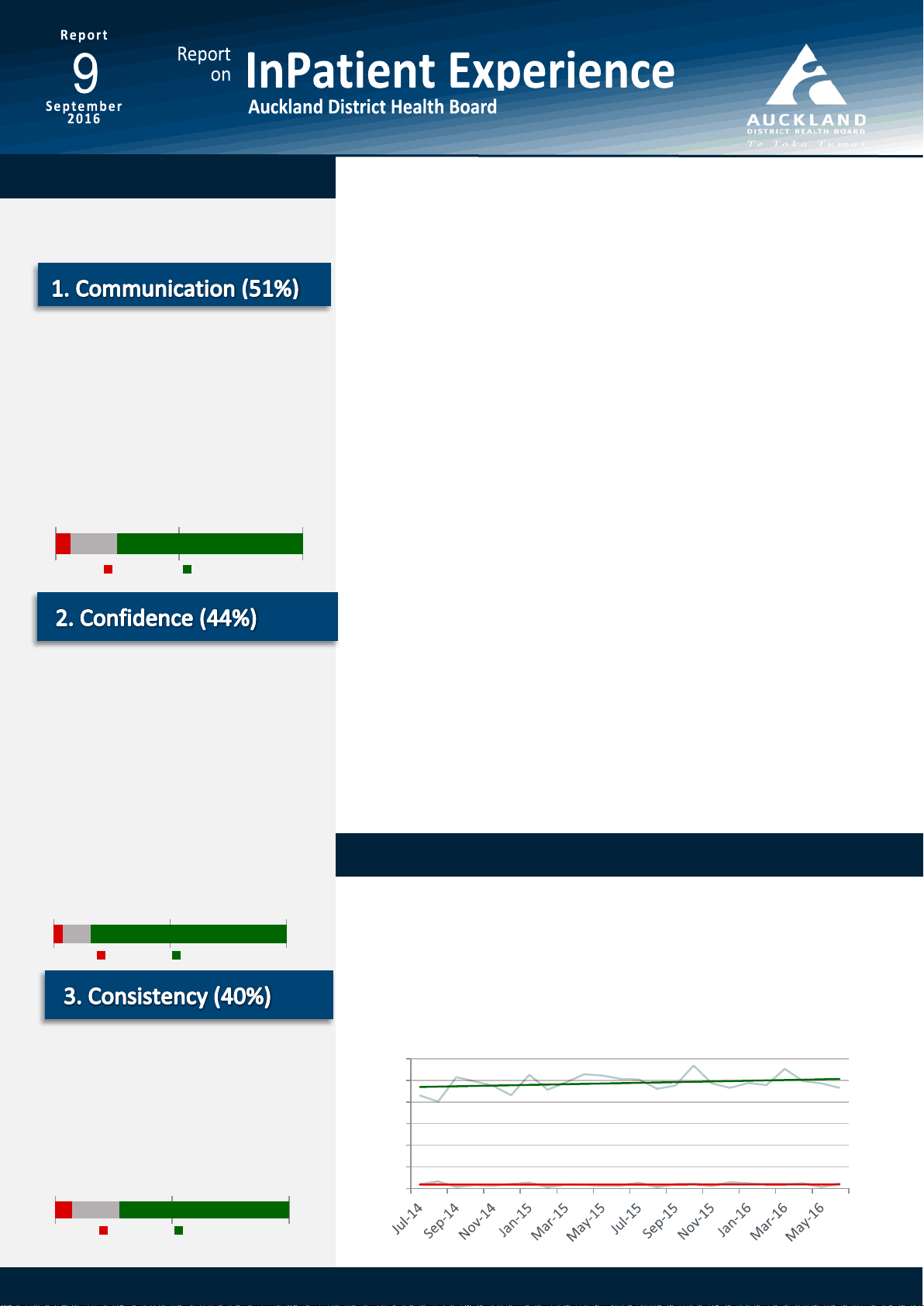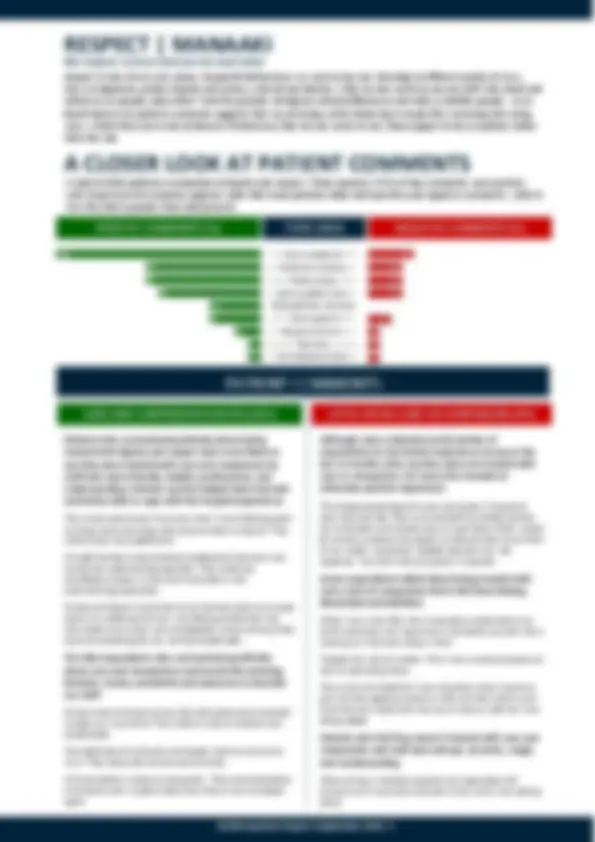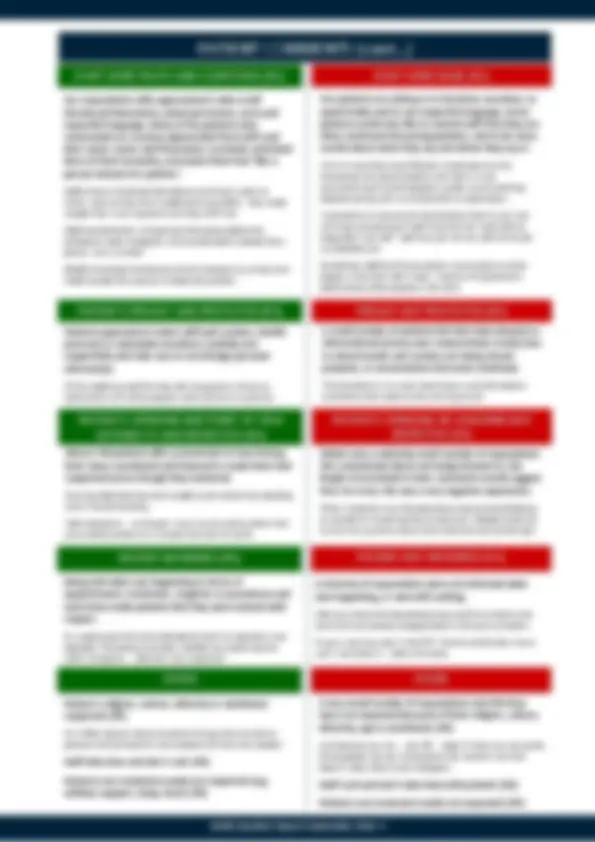




Study with the several resources on Docsity

Earn points by helping other students or get them with a premium plan


Prepare for your exams
Study with the several resources on Docsity

Earn points to download
Earn points by helping other students or get them with a premium plan
Community
Ask the community for help and clear up your study doubts
Discover the best universities in your country according to Docsity users
Free resources
Download our free guides on studying techniques, anxiety management strategies, and thesis advice from Docsity tutors
The importance of dignity and respect in healthcare, as reported by patients in a survey conducted by a hospital in new zealand. The document highlights the percentage of patients who reported being treated with dignity and respect, and the impact of this treatment on their care and treatment. The document also mentions the specific needs of pasifika and asian populations, and the role of communication and compassion in enhancing the patient experience.
Typology: Lecture notes
1 / 4

This page cannot be seen from the preview
Don't miss anything!



Communication is the aspect of our care most patients (51%) say makes a difference to the quality of their care and treatment.
“I was kept very well informed of what was happening at each stage of my stay by all members of staff and any questions I had were always promptly replied to.” (Rated excellent) How are we doing on communication?
6 75 Poor Very good
Our inpatients are asked to choose the three things that matter most to their care and treatment.
Two in every five patients (44%), say that feeling confident about their care and treatment is one of the top three things that matter to the quality of their care and treatment.
“Before our son received [medication] … the nurse called another nurse to double check her calculations. It seemed to be standard procedure and I felt reassured to know the dose had been checked twice.” (Rated excellent) How are we doing with patients feeling confident about their care and treatment? 4 85 Poor Very good
Four out of every 10 patients (40%) rate getting consistent and coordinated care while in hospital as one of the things that make the most difference. “The team I dealt with were very proactive and productive.” (Rated very good) How are we doing with consistent and coordinated care? 7 72 Poor Very good
‘ + ’ = positive change; = no change; ‘ - ‘ = negative change
ADHB Inpatient Report July 2016: 1
Our “excellent” ratings have had a continual upward trend over the past 24 months, rising by a small but statistically significant two percentage points over this time (from an average of 48 to 50 percent). The differences are significant and sustained when demographic factors such as the age and gender of respondents are controlled for.
One in every five respondents say that doctors, nurses or midwives and allied health sometimes or often talked in front of them as if they weren’t there.
Doctors n= 3831; Nurses/Midwives n=3743, Allied Health n=
Adult Community and Long-term Conditions n=121; Adult Medical Services n=393; Cancer and Blood n=130; Cardiovascular Services n=373; Child Health n=915; Surgical Services n=1255; Women’s Health n=474 Overall n=3662. Note that NA answers have been excluded and the data recalculated
Adult Community and Long-term Conditions n=138; Adult Medical Services n=441; Cancer and Blood n=139; Cardiovascular Services n=419; Child Health n=958; Surgical Services n=1364; Women’s Health n=501 Overall n=3961.
76 78 80
10 9 6
13 13 14
Doctors Nurses/Midwives Allied Health No Yes, Sometimes Yes, often
73 60 65 76 79 76 72 72
24 35 31 20 19 23 24 25
3 5 4 4 2 2 4 3 Overall Adult Community and… Adult Medical Services Cancer and Blood Cardiovascular Services Child Health Surgical Services Women's Health Yes, definitely Yes, to some extent No
84 78 81 91 91 84 83 83
14 20 17 8 8 14 15 15
2 3 2 1 1 2 2 2 Overall Adult Community and… Adult Medical Services Cancer and Blood Cardiovascular Services Child Health Surgical Services Women's Health Yes, always Yes, sometimes No
35 percent of our inpatients say that being treated with dignity and respect whilst in hospital is one of the three things that makes the most difference to the quality of their care and treatment
There have been no significant changes in these ratings since the last report in May 2014.
There has been a 2% improvement in the percentage of patients who
(JULY 2015 TO JUNE 2016, n=1385)
AVERAGE RATING
Overall: 8.
AVERAGE RATING BY GENDER
Female: 8. Male: 8.
AVERAGE RATING BY ETHNICITY
NZ European: 8. Māori : 8.
Pasifika: 9. Asian: 8. Other: 9.
AVERAGE RATING BY AGE
17 and under: 8.
25 – 44: 8. 45 – 64: 8. 65 – 74: 9. 75+: 8.
AVERAGE RATING BY DIRECTORATE
Adult Medical: 8.
Cardiovascular: 9. Children’s Health: 8. Surgical Services: 8. Women’s Health: 8.
Note that directorate and age data with less than 100 respondents have been excluded.
STAFF WERE POLITE AND COURTEOUS (9%) STAFF WERE RUDE (3%)
Our respondents (9%) appreciated it when staff introduced themselves, asked permission, and used respectful language. Many of the patients who commented on courtesy appreciated that staff used their name. Some said these basic courtesies reminded them of their humanity, and made them feel “like a person instead of a patient.”
Staff always introduced themselves and always used my name...even asking what I preferred to be called… they made me feel that I was important and they SAW me!
Staff were fantastic, introducing themselves before the procedure made me feel far more comfortable, treated like a person, not a number!
[Staff] introduced themselves [which] reduced my anxiety and made me feel like a person instead of a patient.
Our patients are asking us to introduce ourselves, to speak kindly and to use respectful language. Some patients would also like to remind staff that they are often overheard discussing patients, and to be more careful about what they say and where they say it. I think it would be nice if Doctors introduced not only themselves but [also] students with them, it was overwhelming to have 6 people in green scrubs standing bedside staring with no introduction or explanation. I overheard a nurse say during handover that my son was vomiting and pooing all night and that she "never felt so disgusted in her life." I felt sorry for her but I felt sorrier for my [toddler] son. Sometimes staff could have spoken more quietly so other people in the room didn't hear. I heard a lot of personal details about other people in the room.
PATIENT COMMENTS (cont…)
Patients appreciate it when staff pull curtains, handle personal or vulnerable situations carefully and respectfully and take care to not divulge personal information
All the staff ensured that they did not gossip or share my information with other people in front of me or my family.
A small number of patients felt that their physical or informational privacy was compromised, mostly due to shared wards and curtains not being closed properly, or conversations that were overhead. The 4 patients in my room heard every word the doctors said about their cases at the morning round.
PATIENT’S PRIVACY WAS PROTECTED (9%) PRIVACY NOT PROTECTED (3%)
Almost 200 patients (8%) commented on how having their views considered and listened to made them feel respected and as though they mattered. Nursing staff checking what I prefer to do rather than deciding what I should be doing. I felt listened to … as though I was a human being rather than just another patient or a number that had no worth.
Whilst only a relatively small number of respondents (64) commented about not being listened to, the length of and detail in their comments would suggest that, for most, this was a very negative experience. When I asked for only Panadol (due to being tired of feeling so wasted on morphine) the [nurse] said I needed morphine to shut me up and to take it and make the most of the high.
PATIENT’S OPINIONS AND POINT OF VIEW LISTENED TO AND RESPECTED (8%)
PATIENT’S OPINIONS OR CONCERNS NOT RESPECTED (3%)
PATIENT INFORMED (4%) PATIENT NOT INFORMED (2%)
Being told what was happening in terms of appointments, treatment, surgeries or procedures and wait times made patients feel they were treated with respect.
An urgent case had to be attended to [and my operation was delayed]. The doctors promptly notified me, explaining the shift in schedule ... I felt like I was important.
A minority of respondents were not informed what was happening, or were left waiting. I felt very alone and abandoned once we first arrived on the ward and was severely disappointed in the communication. It was a very busy day in the O.R. I had to wait for four hours until I was taken in. I felt a bit alone.
OTHER OTHER
Patient’s religion, culture, ethnicity or worldview respected (2%)
As a Māori person there are certain things that we hold as personal and private this was treated with the most respect
Staff take time and don’t rush (1%)
Patients non-treatment needs are respected (e.g. whānau support, sleep, food) (1%)
A very small number of respondents (16) felt they were not respected because of their religion, culture, ethnicity, age or worldview (1%) Just because you are … over 65 … doesn't mean you are senile. Some people may be vulnerable at the moment, but that doesn't mean they're not intelligent. Staff rush and don’t take time with patient (1%) Patients non-treatment needs not respected (1%)